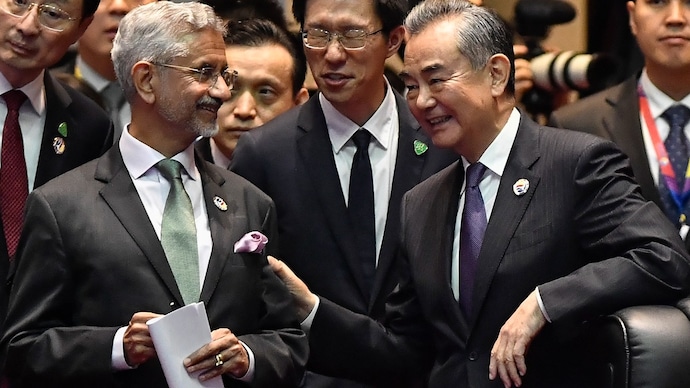China calls for stronger ties with India

China is facing a tariff stand-off with the U.S., which is now influencing its diplomatic outreach to other nations, including India.
Due to these global tensions, China is now keen to strengthen its bilateral ties with India, particularly as they mark the 75th anniversary of diplomatic relations this year.
The focus has to be on enhancing mutual trust, which can happen only by resolving the Indo Tibetan border and vacating by China of all occupied Indian territory in Ladakh.
Inly thereafter there can be people-to-people exchanges, and addressing of economic and trade issues to foster a stable and constructive relationship.
Both countries ten can move towards strengthening their ties, with a focus on mutual cooperation and resolving disputes through diplomacy.
However China’s Foreign Minister Wang Yi has once again reiterated that boundary issues should not dictate the bilateral relations between India and China.
This stance comes amid a backdrop of improved ties following a significant meeting between Prime Minister Narendra Modi and President Xi Jinping in Kazan, Russia, last October.
The meeting had marked a strategic shift towards enhancing bilateral cooperation and reviving dialogue mechanisms, which have led to positive outcomes in various areas of engagement.
Well this is now once again two steps backwards by China !!
Chinese Foreign Minister Wang Yi has reiterated the importance of cooperation between China and India, likening their relationship to a “dance of the dragon and elephant.”
He stressed that mutual support and collaboration are essential for serving the fundamental interests of both nations.
Wang Yi highlighted that if China and India work together, they can strengthen the Global South and promote greater democracy in international relations.
Wang Yi remarked that supporting each other rather than competing is crucial for both countries. He believes that cooperation will accelerate their development and revitalization.
By uniting, China and India can enhance the Global South’s influence and promote democracy in international affairs. This partnership would counter external hegemonic influences and power politics.
Wang’s comments come amidst rising tensions between China and the U.S., particularly due to increased tariffs. China seeks to strengthen ties with India to counter these challenges.
Wang Yi highlighted that both nations have the wisdom and capability to maintain peace along their borders while working towards a fair and reasonable solution to the boundary issue.
He stressed that as the largest Neighbours, India and China should be partners in each other’s success rather than letting specific differences overshadow their overall relationship.
Indian Foreign Minister S Jaishankar has outlined steps to enhance bilateral relations with China, aiming for a “more predictable and positive” relationship.
This comes after Chinese Foreign Minister Wang Yi underscored the importance of cooperation between India and China, likening it to a “cooperative pas de deux of the dragon and the elephant” for mutual benefit and to bolster the Global South.
Jaishankar’s initiatives include resuming pilgrimages to Chinese-controlled sites, restarting direct flights, and facilitating the exchange of journalists.
While India has not officially responded to Wang Yi’s statement, Jaishankar’s comments suggest a willingness to engage constructively with China.
Recent diplomatic efforts, including meetings between high-ranking officials from both countries, have been aimed at addressing bilateral concerns and regional challenges.
The improvement in relations follows a diplomatic chill after the Galwan clashes in 2020 and is marked by significant interactions, such as Prime Minister Narendra Modi’s meeting with Chinese President Xi Jinping in Russia.
Wang Yi’s remarks highlighted the need for India and China to support each other rather than compete, emphasizing that boundary issues should not define their bilateral relations.
He also noted that both countries have a shared responsibility to oppose hegemonies and power politics as major members of the Global South.
The recent disengagement of troops from Depsang and Demchok in eastern Ladakh has been a significant step towards normalizing ties.
Following this, high-level diplomatic engagements have continued, including talks between National Security Advisor Ajit Doval and Wang Yi, as well as Foreign Secretary Vikram Misri’s visit to Beijing.




